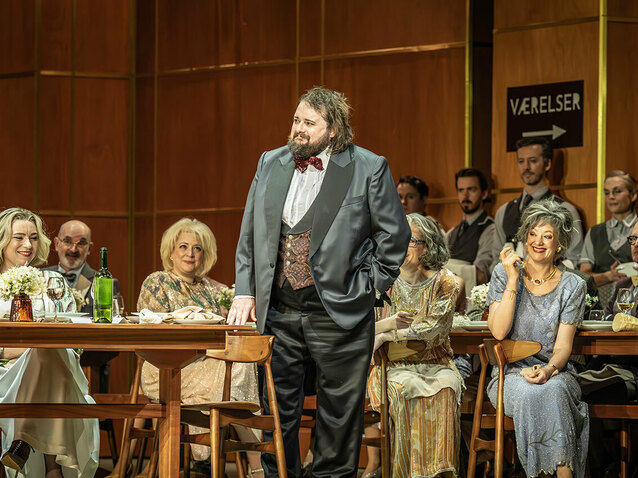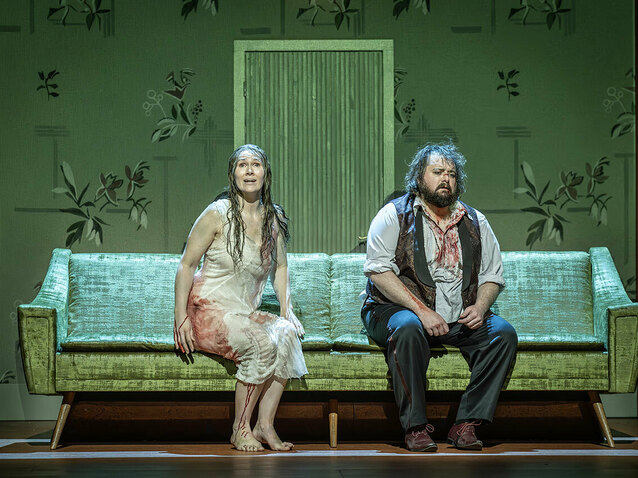 © Marc Brenner / The Royal Opera
© Marc Brenner / The Royal Opera
Thomas Vinterberg’s 1998 film Festen (The Celebration) is a black comedy in which the emphasis should arguably be on the word ‘black’ rather than ‘comedy’. Now, Mark-Anthony Turnage has adapted it into an opera, varying the original story in places. Set in 1989 in a hotel in the Danish countryside, run by Helge and Else Klingefeldt, it sees a gathering to celebrate Helge’s sixtieth birthday. Many friends and family members are in attendance including the three surviving children Christian, Michael and Helena. As the eldest, Christian is tasked with speaking first at the dinner, and Helge wishes to ensure he honours his dead sister Linda during the toasts.
Even as everyone arrives, it is clear that the family has had its fair share of problems, as Michael is aggressive towards his wife Mette, his drunken behaviour at last year’s gathering is frequently mentioned and a waitress claims that he previously impregnated her. Christian too seems rather withdrawn, and we learn that he seldom returns to the place where he grew up, while one of his old flames Pia has also had a hard time over recent years. When Helena goes to the bathroom in which Linda died, she makes a discovery that sees things take a particularly sinister turn.
At the birthday celebration itself Christian makes a shocking assertion during his speech that is initially brushed off as reflecting his own illness or strange sense of humour. As the evening wears on, however, the revelations keep coming, while the prejudices of certain family members come to the fore. The remainder of the story explores how the evening plays out, given the efforts of Helge and others to keep the celebration going in the wake of so many unsavoury truths coming to light.

Allan Clayton (Christian) in Festen, The Royal Opera © 2025 Marc Brenner
Vinterberg, along with Lars von Trier, founded the Dogme 95 movement, whose rules champion films based on the traditional values of story, acting and theme, as opposed to elaborate special effects and technology. As a result, Festen is a good choice for an operatic adaptation given the extent to which the philosophy behind it lends itself to live drama. In Richard Jones’s production, Miriam Buether’s set presents a huge panelled room that, depending on the furniture placed within it, can be either the hotel reception area or the dining room where the celebratory dinner takes place.
In between scenes a front cloth drops, upon which the image of a sofa grows, highlighting its increasing significance to the story. Sometimes this rises again to reveal three different rooms (such as two hotel bedrooms and a bathroom) next to each other. Film is generally geared towards short scenes, and this set-up enables these to be realised here as we cut slickly from the action in one space to another, simply through the lights dimming and the characters freezing. The opportunities afforded by this configuration, as well as by opera which can allow more than one person to espouse their thoughts at the same time through music, also enable things to happen in multiple locations simultaneously that even film could only partly achieve by resorting to split screens.
Overall, one of the most outstanding achievements of this Festen is Turnage’s ability to create an opera that feels so filmic in its proportions. Lasting 110 minutes without interval, it is almost exactly the same length as the original movie. When operas are generally suited to exploring fewer points than films only in more detail, the ability of this one to sweep us along in the same way as a movie does is quite remarkable. E. M. Forster said a story could only have one fault, which is ‘making the audience not want to know what happens next’. It is certainly not a problem that this opera possesses, as it has us sitting on the edge of our seats waiting for the next revelation.

Marta Fontanals-Simmons (Linda), Allan Clayton (Christian) in Festen © 2025 Marc Brenner
It would be wrong, however, to think that the opera is successful simply because it succeeds in appealing to us as a film might. This is because the words and music introduce dimensions that could not be realised in any other medium. Librettist Lee Hall has a way with words that seems not dissimilar to Stephen Sondheim. Rhyming ‘protocol’ with ‘alcohol’ may not sound especially impressive when stated in isolation, but it is the combination of smoothness and apparent simplicity in the lines that makes the libretto extremely effective. Turnage’s score makes routines in which everyone says ‘Hello’ to each other extremely amusing, while a mass debate at dinner over whether the soup is lobster or salmon is absolutely hilarious.
When the entire ensemble sings the nursery rhyme ‘Baa, Baa, Black Sheep’ the music enables the gesture to feel overpowering, but it only proves to be because the context in which it is sung makes it completely shocking and sickening. The same could be said about the instance in which everyone dances the Conga, choreographed by movement director Lucy Burge. Leonard Bernstein wrote one into his 1953 musical Wonderful Town, but that is quite lighthearted in comparison, and the more serious undertones in this case hand it a far greater irony and hence poignancy. At the same time, some of the most powerful moments come when there is complete silence, as the fact the large number of people on stage are incapable of making any sound at all at that point speaks volumes about what everyone has just heard.
The cast size far exceeds the eighteen principal roles stipulated in Giacomo Puccini’s La fanciulla del West, and may well be more commensurate with that of Sergei Prokofiev’s War and Peace. There are certainly a wealth of brilliant performances, not least from Allan Clayton who, with his persuasive tenor, makes Christian an incredibly multifaceted character. Stéphane Degout, with his assertive baritone, is something of a brutish charmer as Michael, while Gerald Finley, with his rich bass-baritone, makes Helge enough of a seemingly upstanding figure to survive the various accusations as well as he does. Natalya Romaniw is an intriguing Helena, and Philippa Boyle a compelling Mette. Thomas Oliemans is highly convincing as Helmut, who as the Master of Ceremonies has to keep everything going in the face of all that happens, while Sir John Tomlinson carries off the role of the loveable but confused Grandpa as perhaps only he ever could. There are also a plethora of other excellent performances from, among others, Rosie Aldridge as Else, Susan Bickley as Grandma, Peter Brathwaite as Gbatokai, Clare Presland as Pia and Marta Fontanals-Simmons as the ghost of Linda.
In terms of ambience the final scene feels a little similar to that of Coraline, Turnage’s 2018 opera that is also based on a film (and novella), because it conveys a sense of the light that follows the darkest hour. In the case of Coraline, however, the joy comes from knowing that evil has been defeated, while any happiness there is here derives from certain people at least being able to sweep the uncomfortable truth under the carpet. Edward Gardner’s superb conducting could hardly be bettered, but the real achievement remains Turnage’s for creating a piece that succeeds both in engaging us in the way that a film can, and in offering us an experience that only opera could ever provide. I wonder if he will be inspired to tackle Lars von Trier’s Dogville next.
By Sam Smith
Festen | 11 - 27 February 2025 | Royal Ballet and Opera, Covent Garden
the 22 of February, 2025 | Print
Comments